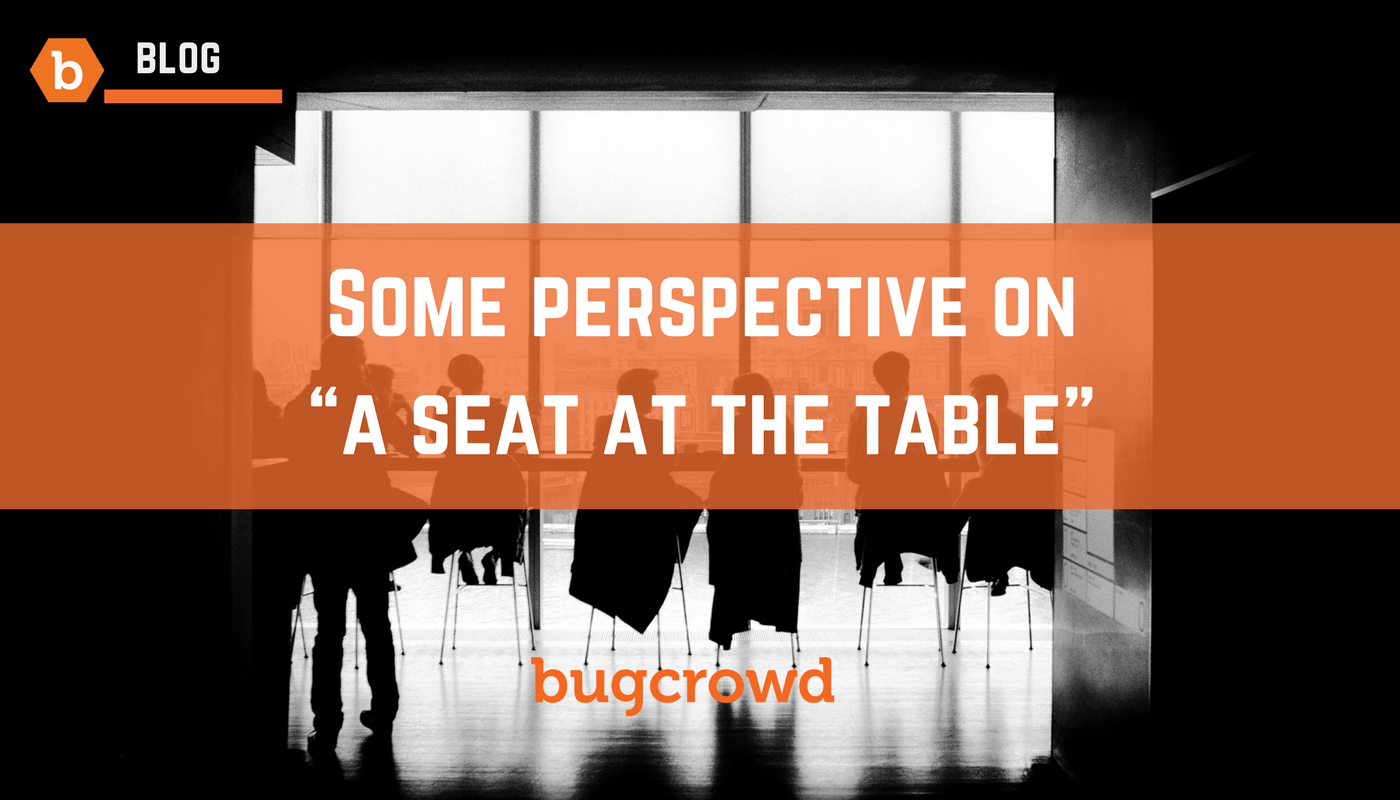We recently attended a very topical event hosted by Costanoa Ventures focused on helping more women get a #seatatthetable at technology firms. Martina Lauchengco, Operating Partner at Costanoa moderated the panel for the full house of attendees which featured female leaders from leading companies like Uber, Linkedin, SurveyMonkey and Nextdoor.
Like the speakers, my Bugcrowd colleagues and I are all at different stages in our careers. The panel members each had unique points of view on the subjects like work/life balance, finding an advocate, being open to feedback and the role of “luck” in their careers.
The meeting spurred lots of dialog that evening and the days that followed. It was a good start to an important conversation. These are some of our key takeaways
Lisa Walsh, Senior Director of Partnerships of Business Development
I lead our Partnerships and Business Development function at Bugcrowd and made the leap to manage global teams several years ago. One of the points Martina and the speakers touched on was the need to take an active role managing your own career. The task can be daunting, so you have to pick a way to get started. I did this by choosing to shape and drive my own professional agenda. I articulated my capabilities, contributions and goals in a very succinct way into an my own “elevator pitch” and was consistent in the way I shared this with others across the organization. I started with simple steps like better managing my weekly 1-1 with my manager, and sending the agenda in advance so that I could manage that meeting time and communicate my team’s accomplishments. This consistent approach let others know I was open and prepared for new opportunities and responsibilities. It also helped me align and develop a relationship with a mentor who continues to help me advance in my career to this day. I had to be an advocate to find an advocate.
Kaila Pollart, Researcher Success Operations Program Manager
I am newer to the workforce. My current role at Bugcrowd is my second position and first project management role. For me, this discussion acted as a reminder to initiate career growth discussions early and often, with an interesting focus on the success of extroverts in asking for what they want and need to be successful. Though there was excellent advice to conversate with those higher up to gain mentors and advocates, my challenge to this group of panelists would be the advice they would give to more introverted women starting their career. These introverted women who may not be as comfortable speaking out for opportunities, and may need even more guidance for how to excel in work environments that value loud voices. I look forward to focusing on career goals and growth here at Bugcrowd, taking the advice given during Seat at the Table, and hope to maintain the work life balance highlighted by all four women on the panel.
Alyssa Habing, Senior Account Manager
I am 6 years into my career journey, and only 4 months into my newest role as an Account Manager at Bugcrowd. Many of the points brought up in the women’s panel discussion resonate well with me, specifically work/life balance, and being open to feedback. Along with these, what’s worked best for me is diversification of experience and recognizing my strengths. Each of the five roles I’ve held have been wildly different and that was all very intentional. I think variety in your skill set better prepares you for the next step in your career. As you experiment in various roles, you gain a better understanding of the elements you prefer in your role as well identify what you’re good at. Harnessing those strengths and indulging in a role that allows you to exercise them is really the key to a successful, happy and satisfying career.
Overall, one of the biggest takeaways from this evening was that it’s all about finding the right position at the right company at the right time. When interviewing for a job, don’t forget that you are interviewing your potential manager and coworkers as much as they’re interviewing you. Career growth is often defined by the relationships we build at work. The best mentors have the ability to shape your career and help you become better at your job, while a bad manager (even if only bad in their own effectiveness) has the potential to limit your potential growth.
This is why thinking about the people you’ll be working with, from the CEO down is critical. Is the organization open or is there a strong hierarchical culture? Will you have access to those senior to your manager, or will your interaction be limited? Is the team supportive and collaborative or is it every person for herself?
Here are a few important considerations when looking for new career opportunities:
- Look for value alignment. How does the organization communicate, prioritize, and make decisions? Is that aligned with your work style?
- Look at the key stakeholders who are involved in the interview process. Make sure the right people are on the interview list since you are interviewing the company in the same way that they are interviewing you. It’s okay to ask to meet additional people that you know are traditional stakeholders for the role. Also, ask for examples of how they have contributed to the career growth of others.
- Conventional wisdom is that your future manager is the most important stakeholder during an interview cycle. Actually, it’s your manager’s superior that is key. These senior executives are always looking at bringing new talent into the organization and can greatly influence your career path at an organization, including which projects or accounts you are assigned. If you feel a personal connection with an executive during your interview cycle, be sure to nurture it once you are in the door.



